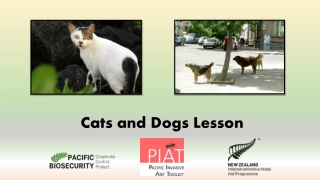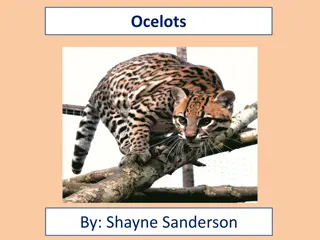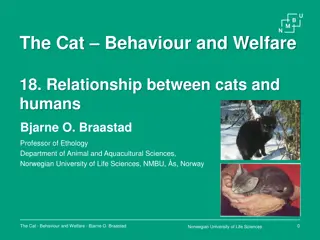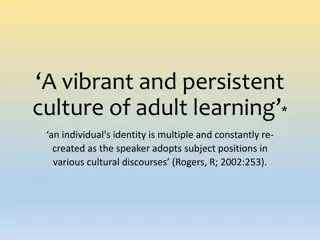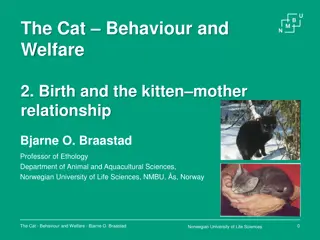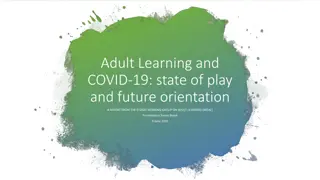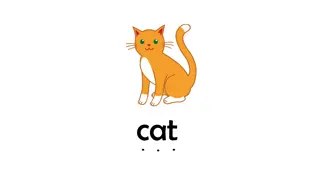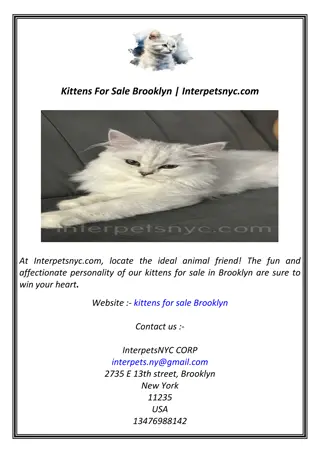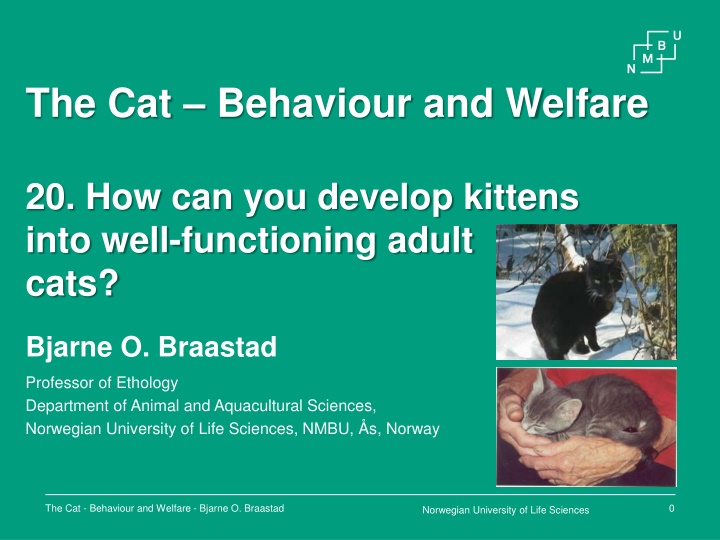
Developing Kittens into Well-Functioning Adult Cats
Learn how to develop kittens into well-functioning adult cats based on research by Professor Bjarne O. Braastad from the Norwegian University of Life Sciences. Discover the heritability of behavior traits, breeding practices, environmental influences, and the importance of early experiences for optimal feline development.
Download Presentation

Please find below an Image/Link to download the presentation.
The content on the website is provided AS IS for your information and personal use only. It may not be sold, licensed, or shared on other websites without obtaining consent from the author. If you encounter any issues during the download, it is possible that the publisher has removed the file from their server.
You are allowed to download the files provided on this website for personal or commercial use, subject to the condition that they are used lawfully. All files are the property of their respective owners.
The content on the website is provided AS IS for your information and personal use only. It may not be sold, licensed, or shared on other websites without obtaining consent from the author.
E N D
Presentation Transcript
The Cat Behaviour and Welfare 20. How can you develop kittens into well-functioning adult cats? Bjarne O. Braastad Professor of Ethology Department of Animal and Aquacultural Sciences, Norwegian University of Life Sciences, NMBU, s, Norway The Cat - Behaviour and Welfare - Bjarne O. Braastad 0 Norwegian University of Life Sciences
How can you develop kittens into well- functioning adult cats?
Heritability of behaviour traits based on paternal half-sibs Behaviour trait Heritability (h2) The cat is active and playful. The cats seeks contact with unfamiliar humans. The cat seeks contact with unfamiliar children. The cat shows fear towards unfamiliar humans. The cat shows fear of loud noise. The cat is sociable towards unfamiliar humans. 0.37 0.31 0.25 0.25 0.22 0.17 (Westbye, 1998, MSc thesis, Norwegian University of Life Sciences, s) The Cat - Behaviour and Welfare - Bjarne O. Braastad Norwegian University of Life Sciences 2
How to get a well-functioning adult cat I Behaviour and mental and physical health are a function of genes and environment/experience. Breeding: In pedigree cats, choice of breeding animals is essential: breed on individuals with low fearfulness towards humans and environment and with a high degree of sociability towards humans. In addition, avoid aggressive behavioural traits as the temperament in parents may influence the temperament in offspring. (Westbye, 1998; Bakken & Vangen, 1996, Turner et al., 1986; McCune, 1995) Environment: Early experience in kittens before being sold or given to new owners will further develop the behaviour the same with experience after rehoming. Norwegian University of Life Sciences 3 The Cat - Behaviour and Welfare - Bjarne O. Braastad
How to get a well-functioning adult cat II Behavioural development: Behavioural development in kittens starts already prenatally. If a pregnant female mammal experiences severe stress (prenatal stress), the offspring may develop hypersensitive stress mechanisms low stress-coping ability. (Braastad, 1998, Effects of prenatal stress on behaviour of offspring of laboratory and farmed mammals. Applied Animal Behaviour Science 61, 159 180) To ensure that kittens learn what they need to about social behaviour, they must be kept with their mother and litter until 12 weeks of age. Both before and after weaning and separation, the kitten must experience challenges it can learn to cope with. Every time a kitten succeeds, self-confidence will increase and make it more robust when facing later challenges. The Cat - Behaviour and Welfare - Bjarne O. Braastad Norwegian University of Life Sciences 4
More on cats behaviour and welfare is found here (in Norwegian) www.braastad.info Braastad s website on ethology, animal welfare, cats and human animal relationship www.facebook.com/KattenAtferdVelferd Facebook (Meta) site for the Norwegian cat book www.etologi.no website for the Norwegian Association of Ethologists www.etologi-dyrevelferd.no website on ethology and animal welfare for secondary schools www.animalpickings.com popular scientific website for the Research Group on Ethology and Animal Environment at the Norwegian University of Life Sciences The Cat - Behaviour and Welfare - Bjarne O. Braastad Norwegian University of Life Sciences 5
Thank you for listening to Bjarne. He believes that he understands me. But we have our secrets that no ethologist yet knows about. The Cat - Behaviour and Welfare - Bjarne O. Braastad Norwegian University of Life Sciences 6

